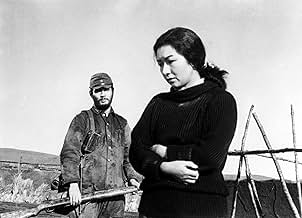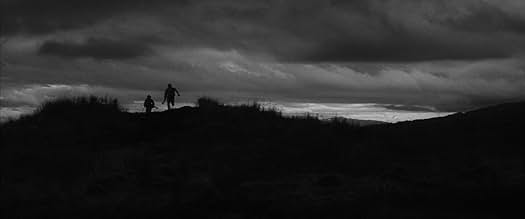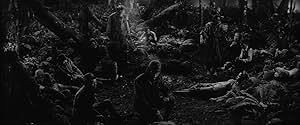La condición humana III: La plegaria del soldado
Título original: Ningen no jôken
CALIFICACIÓN DE IMDb
8.8/10
8.1 k
TU CALIFICACIÓN
Con sus ideales desafiados por la vida como un conscripto en las fuerzas armadas de Japón en tiempos de guerra, un pacifista enfrenta pruebas cada vez mayores en su lucha por la supervivenci... Leer todoCon sus ideales desafiados por la vida como un conscripto en las fuerzas armadas de Japón en tiempos de guerra, un pacifista enfrenta pruebas cada vez mayores en su lucha por la supervivencia.Con sus ideales desafiados por la vida como un conscripto en las fuerzas armadas de Japón en tiempos de guerra, un pacifista enfrenta pruebas cada vez mayores en su lucha por la supervivencia.
- Dirección
- Guionistas
- Elenco
- Premios
- 5 premios ganados en total
Opiniones destacadas
The Japanese troops are defeated by the Soviets and Kaji (Tatsuya Nakadai) heads with three survivors to South Manchurian expecting to meet his wife. Along their crossing through the enemy line in the Manchurian land, other Japanese survivors join Kaji's group, but they need to fight against the Chinese militias and the Soviets.
When they reach a Japanese village with women and one old man, a militia arrives in the place and Kaji and his men surrender to the Soviet to spare the women. The POWs are sent to a labor work camp and Kaji sees no difference between the treatment of the Japanese fascists and the Soviet communists, in which principles Kaji believed. He decides to escape from the camp to meet his beloved Michiko again.
"The Human Condition – Parts V & VI" is the last sequel of the heartbreaking anti-war masterpiece by Masaki Kobayashi. The story is impressively realistic and magnificently shot with top-notch camera work, giving the sensation of a documentary. I have seen many powerful movies about war, such as "Der Untergang", "Taegukgi hwinalrimyeo", "La Battaglia di Algeri", "Paths of Glory" and "Apocalypse Now" among others. But "The Human Condition" is certainly the most scathing antiwar movie that I have seen and I did not feel the 574 minutes running time in a black-and-white movie spoken in Japanese, Mandarin and Russian with English subtitles.
It is impressive to see the treatment spent by the fascist Japanese soldiers for the rookies and how Kaji grows-up and learns how his idealistic concept of communism is shattered when he becomes a POW and swaps his initial position of supervisor to the one of prisoner. The hopeless conclusion fits perfectly to this masterpiece and shows that in times of war, people are far from the condition for being human to survive. My vote is ten.
Title (Brazil): Not Available
When they reach a Japanese village with women and one old man, a militia arrives in the place and Kaji and his men surrender to the Soviet to spare the women. The POWs are sent to a labor work camp and Kaji sees no difference between the treatment of the Japanese fascists and the Soviet communists, in which principles Kaji believed. He decides to escape from the camp to meet his beloved Michiko again.
"The Human Condition – Parts V & VI" is the last sequel of the heartbreaking anti-war masterpiece by Masaki Kobayashi. The story is impressively realistic and magnificently shot with top-notch camera work, giving the sensation of a documentary. I have seen many powerful movies about war, such as "Der Untergang", "Taegukgi hwinalrimyeo", "La Battaglia di Algeri", "Paths of Glory" and "Apocalypse Now" among others. But "The Human Condition" is certainly the most scathing antiwar movie that I have seen and I did not feel the 574 minutes running time in a black-and-white movie spoken in Japanese, Mandarin and Russian with English subtitles.
It is impressive to see the treatment spent by the fascist Japanese soldiers for the rookies and how Kaji grows-up and learns how his idealistic concept of communism is shattered when he becomes a POW and swaps his initial position of supervisor to the one of prisoner. The hopeless conclusion fits perfectly to this masterpiece and shows that in times of war, people are far from the condition for being human to survive. My vote is ten.
Title (Brazil): Not Available
This trilogy was a grueling and rewarding. It was chilling to watch but I persevered. It was about the conflict between nationalism and the individual struggling for humanism. If you transfer yourself to post WW2 Japan you could see how powerful this film was. It was necessary for the soul searching that was to heal the results of the war.
It is as important today as it was then.
This trilogy affected me deeply after watching it.
There is hardly a frame in the ten hours that does not have any sub-text associated with it.
The ten hour film format has some merits maybe it will catch on.
It is as important today as it was then.
This trilogy affected me deeply after watching it.
There is hardly a frame in the ten hours that does not have any sub-text associated with it.
The ten hour film format has some merits maybe it will catch on.
10ibts12
i had listened a lot about this movie but was unlucky that i had not seen this. This is a fascinating movie and i think that i am still feeling effect of the movie on my personality. I never imagined that even a movie can effect someone so much,and also there is feeling that what should be an excellent human condition ( as shown by Kaji and his wife) and what is prevailing human condition as we see around us. I have deep regards for all the crew of the movie who provided us a worth seeing and personality effecting movie. I dedicate all I have learned to the director of movie Masaki Kobayashi.
I have given the movie 10/10 because i find no point to deduct even a single mark. I recommend all serious movie viewers to kindly must see this movie and try to learn from it.
I have given the movie 10/10 because i find no point to deduct even a single mark. I recommend all serious movie viewers to kindly must see this movie and try to learn from it.
Ningen no jôken is a masterpiece film but is also painful to watch most of the time. Nonetheless, it is a tour de force to be lauded for its direction, cinematography and acting at every turn. Most of those commenting in previous discussions mention the virulent anti-war sentiment of the film which is abundantly evident. It was interesting that much of the film is autobiographical, inspired by Kobayashi's war experiences. He too refused to be an officer when he qualified, and stayed a private throughout the war. An interesting point came up when I was watching the fourth DVD in the Criterion edition of The HumanCondition which is a series of three insightful interviews. During his comments the director Masahiro Shinoda mentioned that he thought at the time, the romantic love Kaji had for his wife, Michiko, was overly sentimental and unrealistic. He thought that it was due to the fact that Kobayashi and his peers were born of another age whose romanticism was the norm and unsullied by his generation's sobering war experience. He said that he had also consulted the internet to see the opinions of the film among contemporary young people in Japan today, and found that they too, thought the love unrealistic. He felt the love should have been more erotic and less idealized. The remarks of another commentator solidified my opinion of this issue about Kaji's love. That writer stated that the title really means more like "condition for being human." This confirmed my opinion that Kobayashi's point of the film is that what makes one human, in the best sense of the word, is love. Otherwise we devolve into some type of cruel bestiality found in the phrase 'man's inhumanity to man.' This inhumanity is evident throughout the film, whether in the sadism of the other Japanese soldiers, the cruelty of the guards to the Chinese prisoners, or in the malice of the of the Russian overseers. However, the Kaji character is set apart: he sticks to his ideals, he is humble, he displays selflessness as seen when he gives his food to another or when leading the men and puts them ahead of himself. He is a type of everyman whose being is elevated above merely satisfying physical needs and responding to base instincts. He remains an ennobled human not a saint above the fray, but his love gives him the will to live, to continue on and to even do good when surrounded by evil. Love is the condition for being human.
¿Sabías que…?
- TriviaIs the first Japanese movie in stereo.
- ConexionesFollows La condición humana I: no hay amor más grande (1959)
Selecciones populares
Inicia sesión para calificar y agrega a la lista de videos para obtener recomendaciones personalizadas
- How long is The Human Condition III: A Soldier's Prayer?Con tecnología de Alexa
Detalles
- Fecha de lanzamiento
- País de origen
- Idiomas
- También se conoce como
- The Human Condition III: A Soldier's Prayer
- Locaciones de filmación
- Rishiri-Rebun-Sarobetsu National Park, Hokkaido, Japón(The final scene was shot on the Sarobetsu Plain.)
- Productoras
- Ver más créditos de la compañía en IMDbPro
- Tiempo de ejecución3 horas 10 minutos
- Color
- Relación de aspecto
- 2.35 : 1
Contribuir a esta página
Sugiere una edición o agrega el contenido que falta

Principales brechas de datos
What is the German language plot outline for La condición humana III: La plegaria del soldado (1961)?
Responda






























